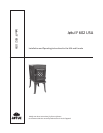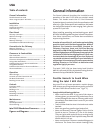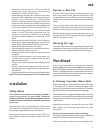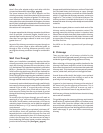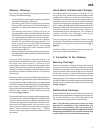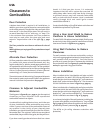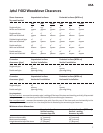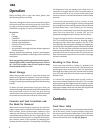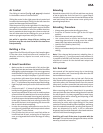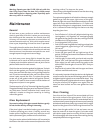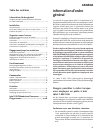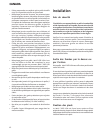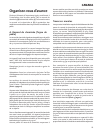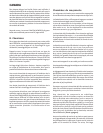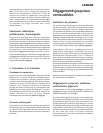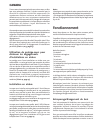9
Air Control
The sliding air control (See fig. 19 B, page 24) is located
in the bottom center of the front door.
Sliding the control to the right opens the air control and
increases the heat output; sliding it to the left closes the
control and decreases the heat output.
Slide the control fully to the right when first starting or
reviving a fire, or when maximum heat is required. Position
the control in the middle or left of the middle when less
heat is needed and when longer burn times are desired.
You will determine the best settings for your particular
needs as you gain experience with your stove.
Hot while in operation. Keep children, clothing and
furniture away. Do not store fuel within the clearances
listed previously.
Building a Fire
A good fire will efficiently utilize your fuel, keep the glass
in the door clean, keep emissions and creosote to an
absolute minimum, require less work, and be very
predictable.
A Good Foundation
• Make sure the air control handle is fully to the right.
Open the front door and cover the bottom of the stove
with tightly crupled newspaper. Criss-cross a generous
double handful of dry kindling, such as split pieces of
scrap lumber, on top of the paper. lf you don't have
scrap lumber, split some of your best dry wood down
to finger-sized pieces and use that. Place three or
four 1 " -2" split pieces of dry wood on top of the kindling.
• Light the paper evenly across the front and close the
door.
• Continue to add 1" - 2" pieces of split dry wood until a
healthy bed of glowing coals has formed.
• You can now add three or four small-to-medium pieces
of wood. Allow this wood to burn for several minutes.
Once you are sure the wood is burning well, adjust the
air control to your desired heat output level. Moving it
to the right increases the heat; moving it to the left
decreases the heat. Avoid operating the stove with
the air control closed completely.
• In order for secondary combustion to occur, the fire
must be well established with temperatures above
1.000
0
F (600
0
C) in the firebox.
• lf the fire dies out, this cause is most likely either an
insufficient bed of coals, reducing the air supply too
soon, or using wood that is either too large or not dry
enough.
Reloading
Reload the stove while it is still hot and there are plenty
of hot to ignite the fresh fuel load. It is a good idea to
include a smaller piece or two of wood at the base of the
new load to help the stove recover more quickly to its
operating temperature.
Reloading Procedure
• Always wear gloves when tending your stove.
• Push the air control to the right to the full open
position.
• Wait a few seconds and open the door.
• Use a stove shovel or similar tool to break up any
remaining charcoal and to drag some live embers
toward the front where combustion air enters.
• Load the fuel (Smaller pieces first).
• Close the door.
• Wait 5-10 minutes and adjust the air control to desired
setting.
Note: lf the charcoal bed present at reloading time is
relatively deep (2"-3") and your wood is well seasoned, it
is possible to add the fresh fuel load, close the door and
reset the air control for the desired heat output rate
within 5 minutes.
Ash Removal
Ash removal will be required every day or two during
normal operation, and is most easily done when the fire
has burned down to coals.
Use a shovel to push or rake any hot coals first to one
side. Shovel out the exposed ash, and push or rake the hot
coal to the other side. Remove the ash from the second
side as well, and then spread the hot coals evenly across
the firebox. Wood may now be added to start a new fire.
When removing ash from a stove that is in operation,
close and latch the door before taking the ashes outside
for safe disposal. It is always a good idea to wear heavy
protective gloves while removing and disposing of the
ashes from your stove.
Ashes should be placed in a metal container used
exclusively for ashes, with a tight fitting lid. The closed
container of ashes should be placed outdoors, well away
from all combustible materials, pending final disposal. lf
ashes are disposed of by burisl in soil or otherwise
dispersed, they should be retained in the closed container
until all cinders have thoroughly cooled.
Overfiring will result if the stove is operated with the
door open. This could cause damage to the stove, void the
warranty or lead to a house fire.
USA



